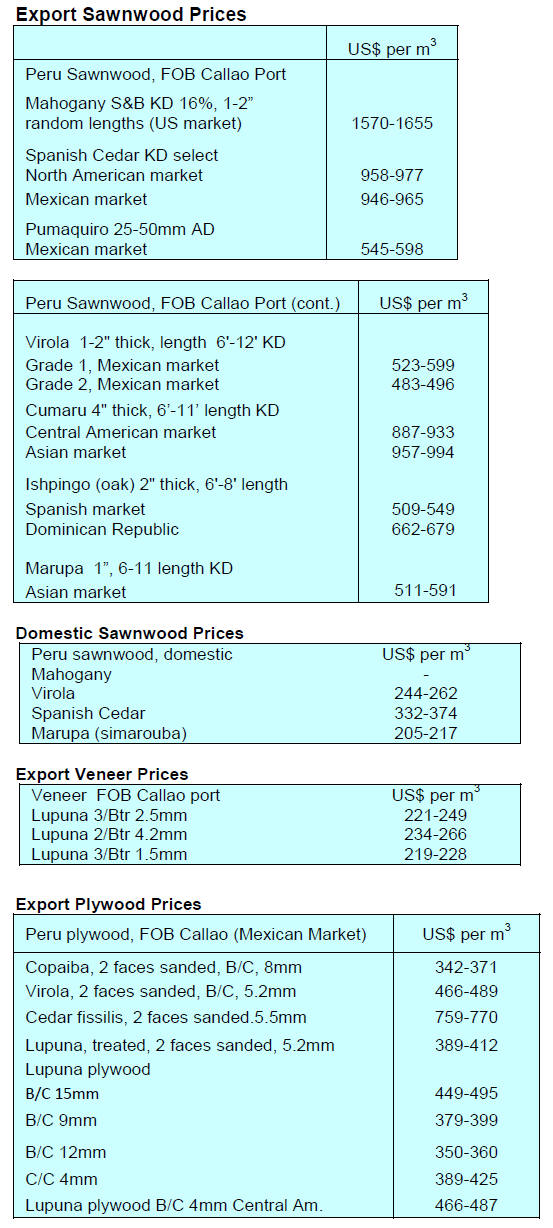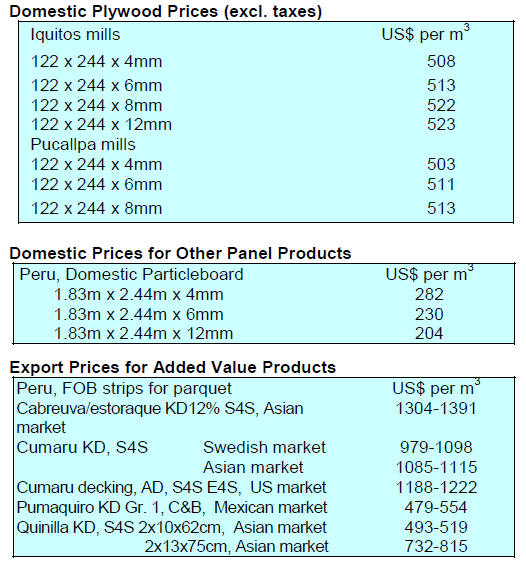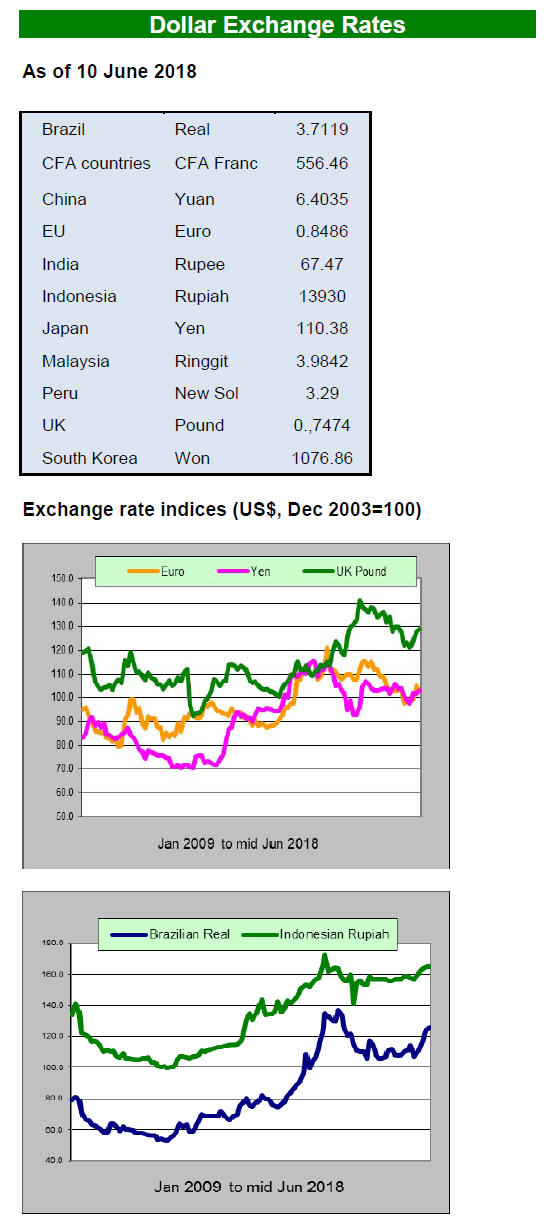2. GHANA
Q1 2018 exports at year on year high
The volume of wood products exported from Ghana in the
first quarter of 2018 amounted to 72,533 cu.m, 18% higher
than in the corresponding quarter in 2017. The revenue
earned was Euro51.48 million, also a significant increase
of 30% over that in the first quarter of 2017.
The major drivers of this positive growth were exports of
air and kiln dried sawnwood, plywood to regional markets,
rotary veneer, curl veneer, billets and dowels.
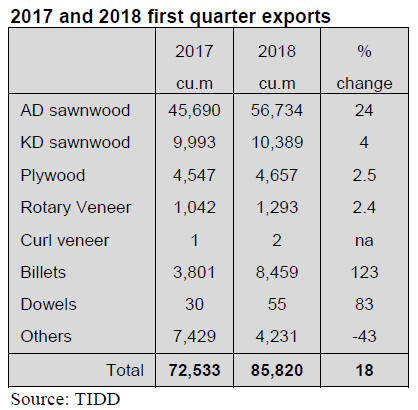
The group ‘Other” wood products in the table above
include air-dried boules, kiln-dried boules and poles which
there were exports in 2017 but not in the first quarter of
2018. On the other hand, there were no exports of
furniture parts in the first quarter of 2017 but a cumulative
total of 324 cubic metres was exported in the first quarter
of 2018.
The most popular species exported included teak (52%),
rosewood (9%), papao/apa (7%), ceiba (6%) and
wawa(5%).
Together, China and India accounted for 78% to continue
to be the leading market destination in the first quarter of
this year, with African regional markets at 7% after
Europe at 10%.
Average unit prices for wood products increased from
Euro 546/cu.m in the first quarter of 2017 to Euro
600/cu.m in the first quarter of 2018.
Reafforestation received massive support
The Ghana government has embarked on an extensive
reforestation drive across the country. The government has
committed over GH¢300 million through the Forestry
Commission and the Youth Employment Authority to fund
a programme for the youth to plant trees across the
country over a two-year period.
The programme will begin in June and will employ around
5,000 young people. The Chief Executive of the Forestry
Commission, Mr. Kwadwo Owusu Afriyie, has been
commended for initiating this youth reforestation
programme.

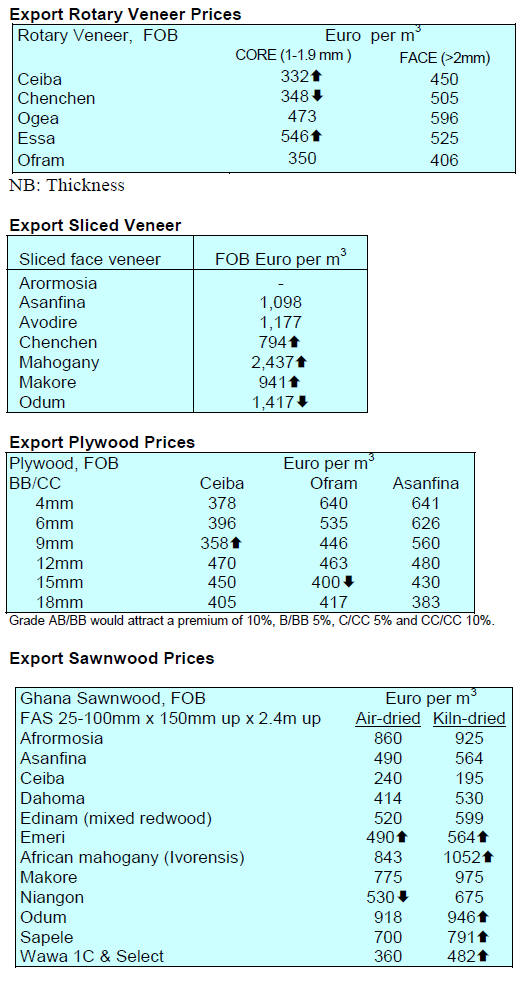
3.
MALAYSIA
Return to previous tax regime could
lower production
costs for furniture makers
The president of the Malaysian Furniture Council (MFC)
has said the repeal of the Goods and Services Tax (GST)
and the re-introduction of the Sales and Services Tax
(SST) will not unduly impact the domestic furniture
industry as exports are not taxed under the SST.
In terms of domestic demand, if the SST is reintroduced at
10% then there would be little change in retail prices for
furniture. The up-side to the return to the previous tax
regime is that production costs could fall as the SST is not
applied to labour inputs.
The MFC expects Malaysia's furniture exports to expand
around 5% from the RM10.14 billion recorded in 2017 on
the back of firming demand in the US, China and the
Philippines.
According to data from the Malaysia External Trade
Development Corporation, the US remained the main
furniture export market in the first four months of this
year. In the same period furniture exports to China jumped
over 50% year on year to RM92 million.
Concern for finances of Sabah logging companies due
to log export ban
Sabah has imposed an interim ban on log exports and
sacrificed a major source of income to ensure the domestic
market enjoy adequate raw material supply. Mohd Shafie
Apdal, Sabah Chief Minister, said the log export ban
announced recently is temporary as a review will be
undertaken to examine the logging and processing sectors.
Deputy Chief Minister and Industry and Trade Minister,
Wilfred Madius Tangau, said the State Cabinet will
examine how best to help local industries and create jobs
for Sabahans while ensuring logging firms do not incur
huge losses because of the ban.
The Sabah forest sector contributed around 7% of total
State income in 2016 and earned just over RM2 billion
from wood product exports. Analysts write “the woodbased
industry in the State is dominated by primary
processing mills many of which are operating well below
capacity due to the shortage of logs”.
The number of mills in Sabah has been steadily falling
from nearly 400 in 2015 to below 200 in 2016 when the
latest review was conducted.
Major plymill switching to plantation logs
Ta An, one of the main timber companies in Sarawak, has
announced it will increase harvests of plantation logs to
supply its plywood mill. Ta An has just over 35,000ha of
plantations, mainly Acacia mangium, of which 22,000 ha
are over 10 years old and can be harvested.
On prospects for 2018, Ta An expects higher demand for
plywood in Japan especially for certified products. Last
year over 90% of Ta An’s plywood was shipped to Japan.
4.
INDONESIA
Indonesia and FAO to
strengthen SVLK
The Ministry of Environment and Forestry and FAO will
work together to help local enterprises cope with the
requirements of the national timber legality assurance
system (Sistem Verifikasi Legalitas Kayu-SVLK).
An agreement for a FAO-EU Forest Law Enforcement,
Governance, and Trade (FLEGT) programme has been
signed by the Director of Forest Product Processing and
Marketing in the Ministry of Environment and Forestry
and FAO’s representative in Indonesia.
The agreement outlines how grants will be processed and
made available to finance work by government
institutions, the private sector associations and civil
society organizations. The aim is to provide capacity
building to stakeholders especially SMEs.
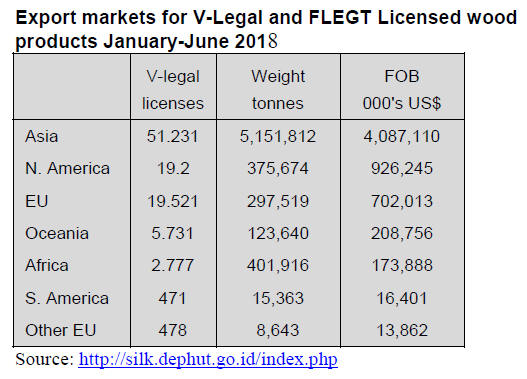
EU and Indonesia launch EU-Indonesia ‘Blue
Book
2018’
Indonesia and the EU recently launched the EU-Indonesia
‘Blue Book 2018’, an annual report of development
cooperation between the European Union and Indonesia.
Analysts write that “the theme of the ‘Blue Book 2018’ is
Climate Change which reflects Indonesia’s and the EU's
commitment to addressing the negative impacts of climate
change.”
A press release from the EU says “The EU has been
supporting several initiatives in Indonesia at the national
and sub-national level in transforming the development
approach and reducing the carbon footprint.
The EU Support to Climate Change Response (EUR 6.49
million) project supporting Aceh Province has introduced
the practice of climate-smart and dynamic agroforestry for
degraded land, conducted in-depth studies on renewable
energy and on carbon-rich peatland protection and has
successfully developed innovative mechanisms at district
level for payment for ecosystem services tailored for
environmental protection and forest conservation by
utilising a Village Fund.
At the national level, the project developed the Capacity
Building and Technology Needs Assessment (CBTNA) to
gather, evaluate, prioritise, and update information on
capacity building and technology needs for reaching
climate change targets set out in the Paris Agreement
ratified by Indonesia. At the provincial level, the project
supported the “Greening" of the Provincial Development
Plans (RPJMD) to reflect climate change commitments
and targets in the official planning and budgeting
framework governing provincial policies of the next five
years.”
For more see:
https://eeas.europa.eu/delegations/indonesia/45119/eu-andindonesia-
highlight-cooperation-climate-change-andenvironment_
en
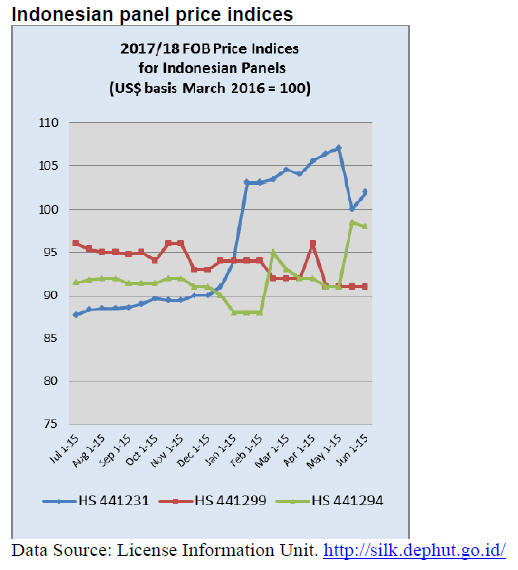
5.
MYANMAR
Exporters overwhelmed by requests for
documents
verifying legality
Myanmar exporters to the EU are reporting that they are
being asked to provide more and more documents to
mitigate the risk of illegal timber entering the supply
chain.
Exporters complain that they have been asked to provide
all the documents described in a dossier compiled by the
FLEGT Technical Advisor to the Forest Department.
This dossier, it is understood, illustrates to importers how
records are kept along the entire supply chain from harvest
to port of exit. The intention behind the dossier was to
explain what documents are produced throughout the
supply chain.
Barber Cho, Secretary of Myanmar Forest
Certification Committee, explained that the purpose of the
dossier is being misunderstood by EU Competent
Authorities as it was not the intention that records of each
step in the supply chain would be submitted to exporters.
Cho pointed out that some of the documents mentioned are
in support of credible traceability.
In related news, according to the Myanmar Timber
Merchants Association, a 10-member delegation will visit
Brussels this month to explain the current traceability and
legality compliance system in Myanmar.
According to U Myo Min, the advisor to the association
and a delegation member, the delegation will explain that
the national traceability procedure consists 30 steps.
The delegation will comprise officials from Forest
Department, Myanmar Timber Merchants Association, the
FLEGT Technical Advisor and representatives from the
private sector and civil society organisations.
Myanmar meets all LDC graduation criteria
Myanmar has met all three eligibility criteria for the first
time to graduate from Least Developed Country (LDC)
status according to the assessment mentioned in the recent
Report of Committee for Development Policy (CDP) of
the United Nations.
This was reported at a meeting of the United Nations
Economic and Social Council, Committee for
Development Policy held in March but the official
notification was only recently released.
This is the very first time Myanmar meets all LDC
graduation criteria since it was listed in LDC in 1987. If
Myanmar continues to meet at least two out of the three
criteria again in the 2021 Triennial Review by sustaining
its current development momentum, it will pave the way
for Myanmar to graduate from the LDC status in the
following years.
World Bank - economy set to grow almost 7% next
year
According to Ellen Goldstein, World Bank Director for
Myanmar, the government’s efforts to accelerate reforms
and to modernise the financial sector could mean that the
economy may grow almost 7% next year. This was made
known at the launch of the latest Myanmar Economic
Monitor that the medium term outlook for Myanmar
remains positive despite some risks.
Goldstein praised the government’s efforts to conclude the
Myanmar Sustainable Development Plan which could
serve as a platform for resolving conflicts that jeopardise
sustained growth.
See:
http://www.worldbank.org/en/country/myanmar/publication/mya
nmar-economic-monitor-reports
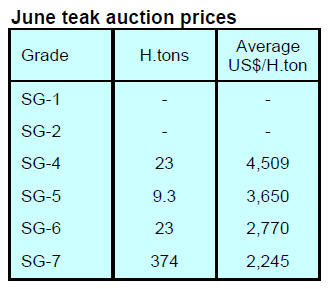
In addition to the regular open auction there was a
Special
Open sale in June at which 1,036 tons of low grade teak
logs were sold at an average price of US$1,626 per H. ton.
6. INDIA
Marayoor Forestry
Department auctions 34 tons of
sandalwood
The latest e-auction of sandalwood conducted by the
Marayoor, Kerala Forestry Department earned Rs281.10
million from the sale of around 34 tonnes of sandalwood
logs. Marayoor sandalwood is of high quality and is used
in the international cosmetic and perfume industries.
There has been a visible decline in the illegal smuggling of
sandalwood from the Marayoor forests with only nine
cases prosecuted in 2017. Illegal felling is still common in
private forests but has fallen in other areas following the
successful control by the police and forestry officers.
For more see:' Red sanders can be grown like any other crop' -
The Hindu
Plantation teak prices
Demand for imported logs continues unchanged but
imports are still affected by the withdrawal of credit
facilities. Another factor impacting imports has been the
weakness of the rupee.
The rupee has fallen against the US dollar by around 5%
over the past month making imports more expensive.
Analysts write that “under these circumstances any rise in
C&F prices is ruled out”. The trade feels that the normal
banking facilities could be restored by the end of July.
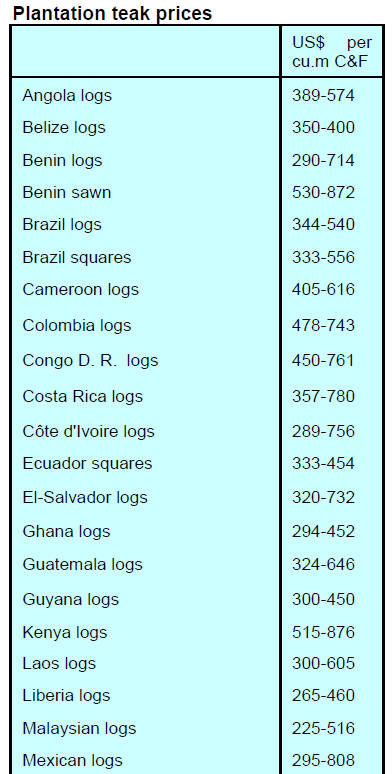
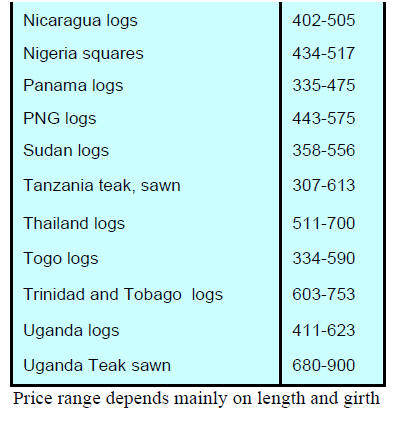
Locally sawn hardwood prices
Traders are under pressure from suppliers to raise prices
but say this is not possible because of stiff competition
amongst traders who are offering alternative timbers
coming from Guyana and Gabon for example.
As is usual, consumers look at price and what is suitable
for the enduses and are less inclined to follow tradition.
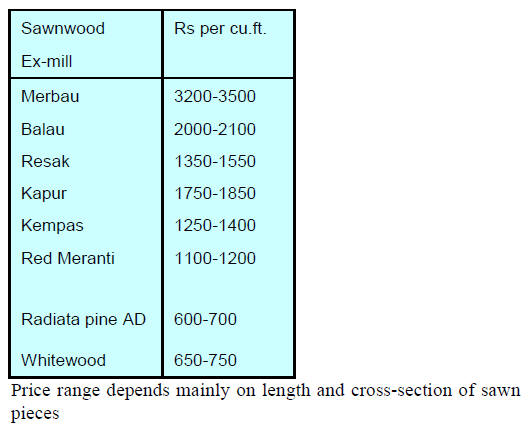
Imported sawn Myanmar teak
The consensus in the trade is that more and more endusers
are moving away from using Myanmar teak as they
find cheaper alternate species good enough for their
purpose.
The trading patterns are changing with teak and gurjan
slipping into the history book because of delivery issues
and prices compared to alternatives.
Gurjan is being replaced by peeler quality logs from
Guyana and imports of okoume veneers have encouraged
some factories to switch completely over to new source.
Indian companies are expanding veneer production in
Gabon. However, Indian endusers still equate red coloured
veneer with strength which has driven some millers to
using pigments to colour pale imported veneers.
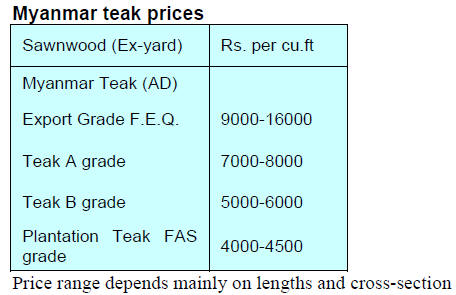
Prices for imported sawnwood
Prices for imported sawnwood (KD 12%) ex-warehouse
remain unchanged.
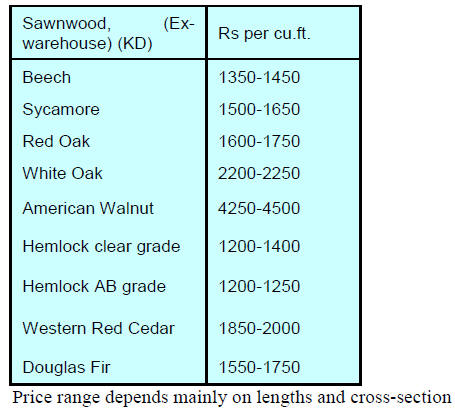
Domestic plywood update
As the prospects are for more rupee weakness which will
drive up raw material costs millers are intending to raise
plywood prices by between 5 to 10% from 1 July 2018.
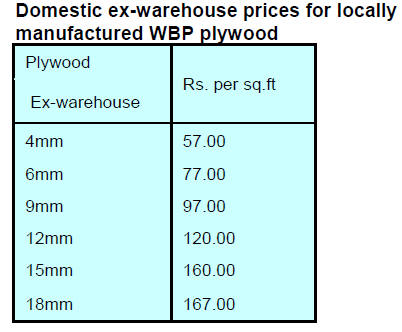
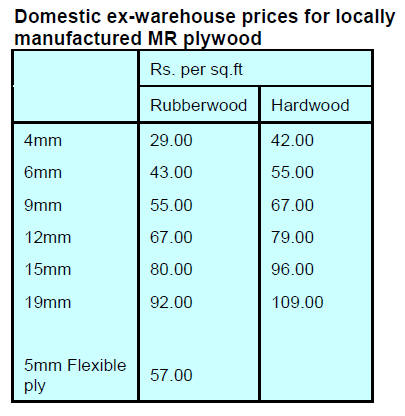
7. BRAZIL
Furniture output shows healthy growth but
below
average in major furniture producing states
April was a good month for the Brazilian furniture
industry. Output increased across the country. However,
while the average national growth in output was 13.5% in
comparison with April last year, in Paraná output
expanded just 9% and in Rio Grande do Sul just 8%.
Between January and April this year, while national
furniture production grew 10%, in Paraná it was only 7%
and in Rio Grande do Sul only 5% year on year. Over the
past 12 months the furniture industry across the country
recorded an 11% increase in production.
Controlled price structures compromises
competitiveness
The Center for Timber Producers and Exporters of Mato
Grosso State (CIPEM) has warned the minimum prices for
forest products set by the State Secretariat of Finance
(SEFAZ-MT) through Administrative Ordinance
“Portaria” Nº 052/2018, may compromise the commercial
competitiveness of timber production of Mato Grosso state
compared to other states.
To address this CIPEM has initiated a dialogue with
SEFAZ-MT emphasising that the state government should
consider the approach taken in other competing states
saying, if the current structure is maintained there will be
an increased risk of weakened competitiveness.
CIPEM requested and was granted a suspension of
Portaria 052/2018 until a review can be conducted without
any immediate change in the basis of the tax Circulation of
Goods and Services). Forestry represents the main
economic activity in 44 municipalities in the Mato Grosso
State so disruption of industrial activity could undermine
State revenues.
Growth of tropical timber exports
Carrefour International Du Bois, considered one of the
largest wood products fairs, was held in late May and
entrepreneurs from Mato Grosso State participated in
search of new technologies and markets.
According to CIPEM local forestry sector
entrepreneurs
picked up many tips on trading in international markets.
Encouragingly, it was learnt that global purchases of
tropical wood products are expected to expand around
30% this year, well above the forecasts made by CIPEM at
the beginning of this year.
Brazilian wood panels exports increase
Exports of Brazilian made wood-based panels in the first
quarter of 2018 totaled US$73 million, an increase of 14%
over the same period last year.
Between January and March of this year the main markets
for woodbased panels were Latin America (11% increase,
equivalent to US$39 million) and North America (21%
increase, US$17 million).
In terms of volume, exports of woodbased panels totaled
308,000 cubic metres in the first quarter of this year, an
increase of 8.5% over the same period in 2017.
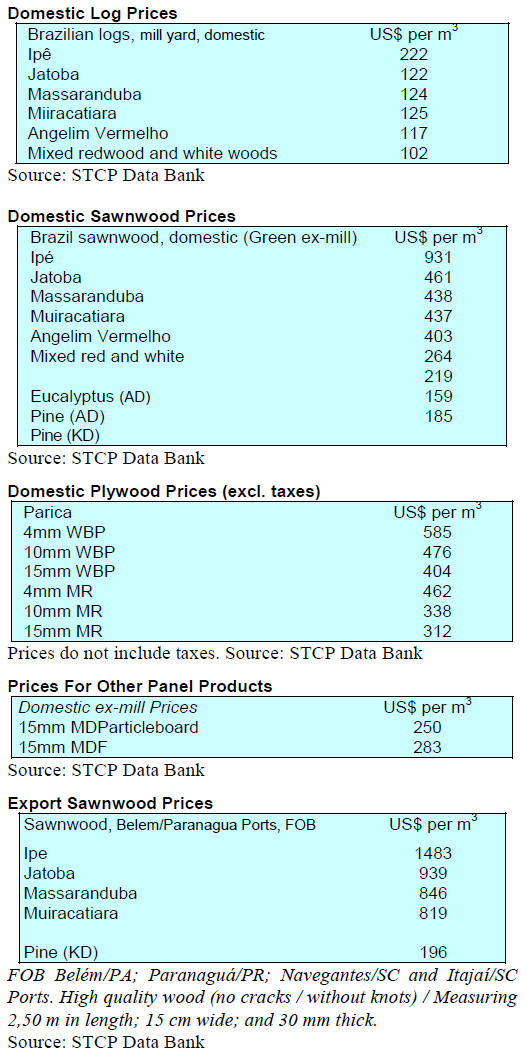
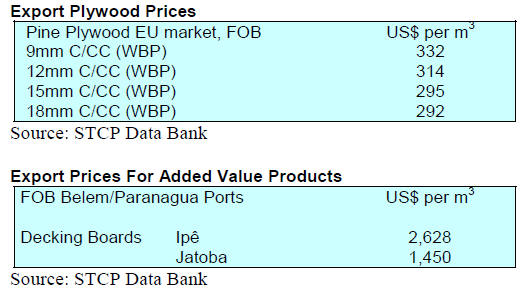
8. PERU
Imports of wooden furniture continue to
decline
In the first quarter of 2018, Peru’s imports of wooden
furniture totalled US$11.7 million, a drop of 13%
compared to the same period of last year.
Brazil was the main supplier at US$7.5 million which
represented 68% of total furniture imports in the quarter.
China followed at US$6 million then Chile at
US$400,000.
Peru’s main importers of wooden furniture in the first
quarter were Sodimac, the home improvement chain of the
Falabella Group, (US$4.3 million) then Homecenters
Peruanos (under its banner Promart) at US$2 million.
Consolidated imports of these two home improvement
retailers accounted for 54.8% of the total wooden furniture
imported to Peru.
Technology to fight deforestation in San Martín
Control and surveillance for an early warning of
deforestation was boosted by a decision of the sixth
meeting of the Regional Forestry Board convened by the
Regional Environmental Authority (ARA) of San Martin
to use drones.
This initiative will streamline monitoring efforts in areas
that are under strong pressure from illegal loggers and will
also be utilised in areas of timber and non-timber forest
concessions.
A monitoring unit and geographic information system by
Amazónicos por la Amazonia for surveillance in private
and community conservation initiatives in San Martín was
demonstrated thanks to the support of World Resources
Institute.
ADEX - work of the forestry board will add value to
Peruvian forests
The Minister of Agriculture and Irrigation, Gustavo
Mostajo, has stressed the importance of encouraging the
reform of the forestry sector to avoid unsustainable and
illegal activities such as the cultivation of coca leaf and
informal mining.
ADEX Vice President, Erik Fischer in supporting the
Minister statement said the wood processing sector needs
th support of many public institutions.
Mining companies ready to support
reforestation
Representatives of commercial miners have expressed
their willingness to continue supporting agricultural
projects and reforestation in the areas where they operate.
This was announced during the 1st Agrominera
Convention that took place recently.
During the event, officials of mining companies and two
regional governors commented on the coordination they
have been carrying out for some years on self-sustainable
projects related to agriculture and forest reforestation in
the mountains of the country.
